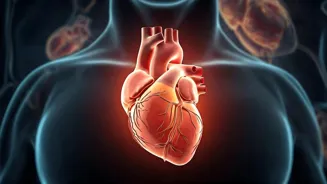Persistent Chest Discomfort
Chest pain is the classic symptom of heart issues, but it is not always straightforward. The pain can manifest in various ways, from a sharp stabbing sensation
to a dull ache or pressure, and it may radiate to the arms, back, neck, jaw, or stomach. This discomfort can last for more than a few minutes, worsening with physical activity or stress. It is essential to recognize that chest pain can also stem from other causes, but any persistent or unusual chest discomfort should be checked by a healthcare professional promptly. Ignoring such symptoms can lead to severe consequences, making early diagnosis and intervention critically important.
Shortness of Breath
Difficulty breathing, or shortness of breath, is another significant warning sign. The heart's function of efficiently pumping blood throughout the body is crucial for delivering oxygen to all organs. When the heart is compromised, it may not be able to pump enough blood, leading to the lungs becoming congested and causing breathlessness, even during rest. This sensation can worsen during physical exertion or when lying down, making it challenging to complete everyday tasks. If shortness of breath is a new or worsening symptom, it warrants a thorough medical evaluation to determine the cause and ensure that treatment is provided.
Unusual Fatigue & Tiredness
Excessive fatigue or unexplained tiredness can be an early symptom of heart problems. This fatigue differs from regular tiredness after a long day; it is an overwhelming feeling of exhaustion that does not improve with rest. The heart works tirelessly to circulate blood, and when it is not functioning well, the body must work harder to compensate. This increased effort can lead to a feeling of constant fatigue, making simple activities seem difficult. Persistent, unexplained fatigue should never be ignored, especially when coupled with other symptoms. It is necessary to consult a healthcare provider to determine the underlying cause and get the necessary medical attention.
Lightheadedness & Dizziness
Feeling lightheaded or dizzy can also point to a heart problem. When the heart's ability to pump blood to the brain is compromised, the brain may receive an inadequate supply of oxygen, resulting in dizziness or lightheadedness. These symptoms can occur when changing positions, such as standing up quickly, or they can be persistent. In severe cases, lightheadedness can lead to fainting. The lack of adequate blood flow to the brain is a serious concern that demands immediate attention. If you experience these symptoms frequently, seek medical advice to diagnose and treat the underlying cardiovascular issue.
Irregular Heartbeats & Palpitations
Palpitations, or an irregular heartbeat, are a common indicator of potential heart trouble. These can feel like a fluttering, racing, or pounding sensation in the chest. While occasional palpitations can be harmless, frequent or prolonged irregularities may signify a problem with the heart's electrical system. This disruption can hinder the heart's ability to pump blood efficiently. Other symptoms, such as dizziness, shortness of breath, or chest pain, accompany the irregular heartbeat. When these symptoms persist, they must be evaluated by a healthcare provider to rule out any serious heart conditions and receive appropriate treatment.
Swelling in the Body
Edema, or swelling in the legs, ankles, feet, or abdomen, can be related to heart problems. When the heart's pumping ability is compromised, it can lead to fluid buildup in various parts of the body. This swelling, also known as edema, often occurs in the lower extremities because of gravity. It can also affect other organs. This is often a sign of heart failure or other cardiovascular conditions. If you notice persistent or worsening swelling, it is critical to get it checked by a healthcare provider. Early diagnosis and intervention can prevent complications and improve outcomes.
Pain Radiating to Other Areas
Heart-related pain may not always be limited to the chest. Pain can radiate to other areas of the body, including the arms, back, neck, jaw, and stomach. This pain might feel like a dull ache, pressure, or squeezing sensation. Pain that radiates to these areas, especially when accompanied by chest discomfort, shortness of breath, or other warning signs, could be a sign of an underlying heart condition. Promptly consulting a medical professional to determine the cause of the pain and begin an appropriate treatment plan is recommended. Ignoring these radiating pains can lead to severe complications.
Nausea, Indigestion, Heartburn
Nausea, indigestion, and heartburn can be symptoms of a heart attack, especially in women. These symptoms might be mistaken for gastrointestinal issues. These symptoms can occur alone or with other heart-related symptoms. The vague nature of these symptoms can make it difficult to identify a heart problem. The subtle presentation means they're easily overlooked. If you have a history of heart problems or risk factors like high blood pressure or diabetes, and you experience these symptoms along with any other warning signs, immediately seek medical attention to rule out a cardiac event.
Excessive Sweating & Cold Sweat
Unexplained or excessive sweating, sometimes accompanied by a cold sweat, can be a sign of a heart problem. This can occur even when you are not physically active or in a hot environment. The body's stress response during a cardiac event can trigger this sweating, making you feel clammy or cold. This can happen when the heart is struggling or experiencing a blockage. If you experience this symptom along with chest pain, shortness of breath, or other warning signs, it is essential to seek immediate medical attention to get appropriate treatment and evaluation.
Changes in Skin Color
Changes in skin color can indicate inadequate blood flow. Pale or bluish skin, known as cyanosis, can occur when the blood does not carry enough oxygen. This color change is most often observed in the lips, fingers, and toes. In some cases, the skin may appear ashen or gray. These changes signal that the body's organs are not receiving adequate oxygen, which can result from severe heart problems. If you notice changes in skin color alongside other warning signs, immediately seek medical help to get a diagnosis and start treatment.













